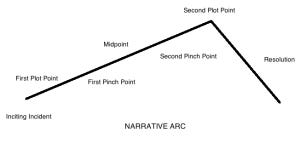From Logline to Narrative Arc: Connecting the Dots, Part One
Let's explore another lens through which we might outline our work.
This post is part of the Outline With Me series. For more like this, check out the outlining your novel page.
Now that you've got your logline, you may feel ready to hop right into writing your manuscript. Though I never discourage playing in the literary sandbox, so to speak, I feel that once a logline has been established, it's in a writer's best interest to start hammering out more of the details before diving too deep into their narrative. As mentioned in this podcast, I'm more of an outfit guy than a pants guy, after all, and as such I find outlining imperative to success.
But where to start with an outline? It's just a matter of beginning-middle-end, isn't it? Yes, in a very broad brushstrokes way. If we zoom in to a level that gives us a bit more detail, though, we actually find a seven-point structure instead of three. Using a seven-point structure, we can turn our logline into a narrative arc as seen below.

For the purposes of this series, let's use the logline below as the basis for developing a narrative arc.
"A Mormon bartender must save the family business before the state revokes its liquor license... or he won't be able to afford Grandma's surgery."
Hawk-eyed readers will notice I've done away with the "In a world where..." clause, which can be used to introduce the notion that this story will take place in a world unlike our own. Given that this clause has been left out, it's safe to assume our Mormon bartender will be operating in something approximating the modern day.
Looking at the picture above, we see that the launching pad for our narrative arc is the inciting incident. Let's explore what that is and why it, like the other six components to our narrative arc, serves as such a fundamental piece of the plot structure.
Inciting Incident
The inciting incident does just that: it incites. This is the moment that rocks your main character's world, hooking the reader through an unexpected twist or unusual, suspenseful, or mysterious moment.
Looking at our logline above, I can identify a few candidates for possible inciting incidents. In my mind, this story's most compelling inciting incidents should relate to either:
the identity crisis likely inherent to an individual who identifies as Mormon but is also a bartender
the revocation of the liquor license
Grandma's surgery or general health
Of these three, I personally feel that a change in Grandma's health would make for the best candidate as an inciting incident. Why? Compared to the other two options, it has the broadest opportunity for emotional appeal, and a change in Grandma's health will clearly be central to the plot as evidenced by its appearance as the [consequence] clause in our logline.
Building upon that, there should be a fair number of opportunities to explore the identity crisis cited in the first bullet point throughout the book. The possible revocation of the liquor license, too, will make for a major component of our story, but I think it can be better capitalized upon if used as a way to turn up the pressure on our main character later on.
So let's see what we can do in terms of creating an inciting incident scene. Since we don't have a name for our main character yet, let's use "Joseph" as a placeholder for the time being.
Inciting Incident: After a long night tending his family's bar, Joseph returns home to find his Grandma collapsed on the bathroom floor.
Oh no! Grandma! What could have caused this collapse? Is she going to be okay? How will this change things for Joseph going forward? These are all great questions, questions that you as the writer don't even have to have answers ready for yet. Leave yourself some wiggle room to better sculpt the details later on. It helps to start getting some ideas ready (I already think I know the direction I'll want to take this), but let's just see where this goes if we leave it open for the time being.
First Plot Point
From the inciting incident, your character should then find themselves on the trail toward the first plot point. This moment is the equivalent of the "Crossing The Threshold" element of Joseph Campbell's (no relation) "Hero's Journey" structure for those of you who may be more familiar with that. Essentially, the first plot point is the moment where your character makes a decision that will forever change the trajectory on which they find themselves. Think of Jon Snow joining the Night's Watch, Ned Stark agreeing to be Hand of the King, or Lady Catelyn taking Tyrion prisoner, for example.
PRO TIP: Run your plot through both the seven-point structure and the Hero's Journey setup to see how it changes your story's emphasis points. Does one seem to work better for your story than the other? Roll with that one instead!
For our story about the Mormon bartender, let's see what we can conjure up for a first plot point. A quick brainstorm leaves me with a few options.
Joseph learns the family bar—their primary source of income—may lose its liquor license.
Joseph strikes a deal with his liquor distributor, buying more in bulk than usual to get a better deal. He plans on using the increased profits from the deal to pay for Grandma's operation.
Joseph elects to sell the family business in order to fund Grandma's operation.
Taking these one-by-one, I'm going to eliminate the first bullet point right away. Why? Because Joseph isn't making a decision. Remember, your protagonist has to actively decide to cross some sort of threshold at this point in your narrative arc.
The second and third bullet points meet our established criteria for a first plot point, but I prefer the second to the third for one important reason. If Joseph were to sell the bar outright, the story could certainly go on, but that would leave Joseph with significantly fewer options once Grandma's surgery was paid for (assuming the sale price of the bar was equal to or greater than Grandma's yet defined surgery). I think getting into the logistics of selling a bar at this point in the story would bog it down, generally, kind of in the same way that continue to explore this option is bogging down this blog post.
That being said, let's roll with option two. I feel this is the best option because 1) our protagonist is actively making a decision, 2) it demonstrates he must have some wherewithal where the business is concerned, or at least an admirable propensity for risk-taking, and 3) through his relationship with his liquor distributor, we'll have a solid opportunity for show-not-tell character development.
Not to mention, going with option two will set us up well for our first pinch point, which we'll discuss in the next section. The below is what we've got so far, then.
Inciting Incident: After a long night tending his family's bar, Joseph returns home to find his Grandma collapsed on the bathroom floor.
First Plot Point: Joseph strikes a deal with his liquor distributor, buying more in bulk than usual to get a better deal. He plans on using the increased profits from the deal to pay for Grandma's operation.
With the first two of seven components to our narrative arc sorted, let's move on to the first pinch point, the final arc-component we'll explore in this week's post.
First Pinch Point
Simply put, the first pinch point pinches. It will tighten the vice in which a character finds him- or herself, often by introducing the antagonist this character will confront for the remainder of the arc.
Taking a look at our logline, I think it's apparent where a "pinch" might come into play—the revocation of the liquor license.
Given what we know to this point, it would be perfectly reasonable to settle on the idea of a liquor license revocation as a pinch point, but I like to think we can do better. True, characters do struggle against concepts and ideas all of the time. Take Luke Skywalker fighting against the idea of the Empire, for example.
But what would Star Wars be without Vader? Vader embodies the idea of the Empire and himself becomes the antagonizing force, with the Empire and all it represents becoming more thematic than anything.
With that in mind, let's see what we can do in terms of a first pinch point.
Inciting Incident: After a long night tending his family's bar, Joseph returns home to find his Grandma collapsed on the bathroom floor.
First Plot Point: Joseph strikes a deal with his liquor distributor, buying more in bulk than usual to get a better deal. He plans on using the increased profits from the deal to pay for Grandma's operation.
First Pinch Point: Gayle Heartly, newly elected head of the town council, informs Joseph that his bar's liquor license is unlikely to be renewed.
And just like that, an antagonist is born. Gayle is now a person that Joseph (and hopefully the reader) can direct their anger and frustration at directly. Why would Gayle do such a thing? What's his angle? Why does he hate Grandma?
Finally, why did he wait until after Joseph paid for all that surplus liquor to break this news to him? Gayle, you are such a jerk. You are a big jerk who is making things really difficult for Joseph and Grandma.
But hey! That's okay. We need jerks like Gayle to keep our narrative arc developing smoothly.
So what's next for Joseph, Grandma, and Gayle? In next week's post, we'll talk about the remaining four components to a narrative arc: the midpoint, second pinch point, second plot point, and resolution!





